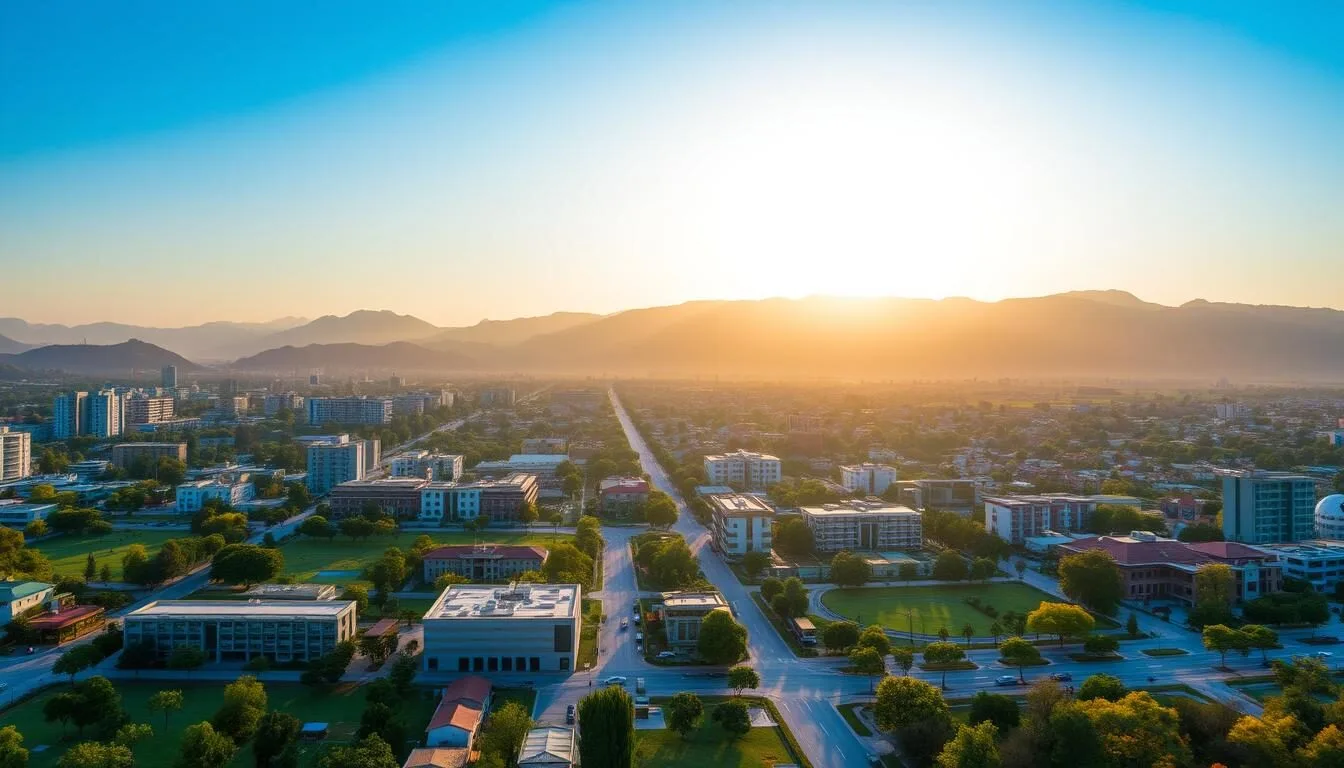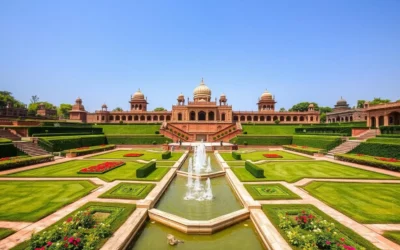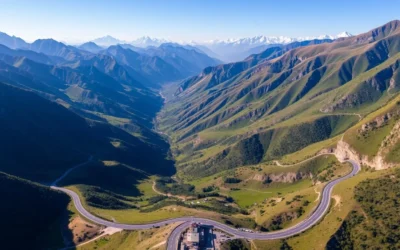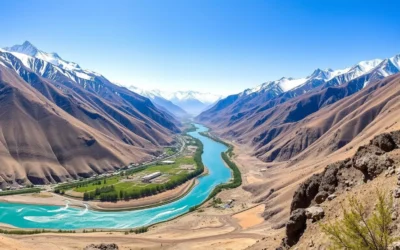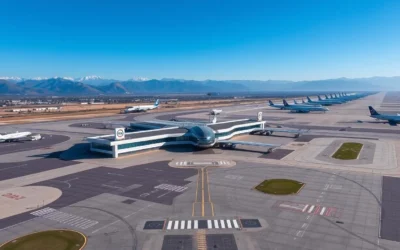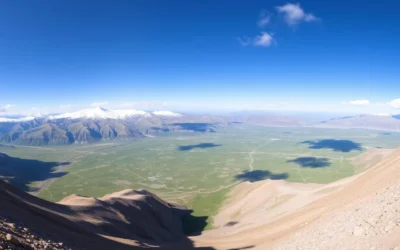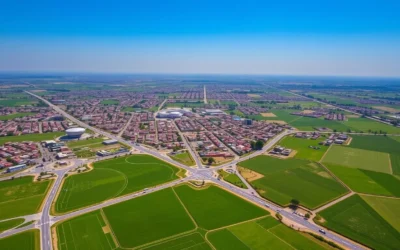✓ Accommodations✓ Flights✓ Rental Cars
Islamabad ranks as one of Asia’s greenest capital cities, with over 40% of its area dedicated to parks, forests, and natural reserves. This planned city, nestled against the stunning Margalla Hills, offers a refreshing contrast to Pakistan’s bustling urban centers while providing visitors with a perfect blend of natural beauty, cultural experiences, and modern amenities.
Planning Your Journey to Islamabad
Before diving into the best things to do in Islamabad, let’s cover some essential planning information to make your trip smooth and enjoyable. The capital city offers a unique experience compared to other Pakistani cities, with its organized layout, clean streets, and abundant greenery.
Ready to Explore Islamabad?
Start planning your journey to Pakistan’s green capital with these essential travel services:
Best Time to Visit Islamabad
Timing your visit right can make a significant difference in your Islamabad experience:
September to October (Recommended)
The autumn months offer pleasant temperatures with cooler evenings, making it ideal for exploring the city and hiking in the Margalla Hills. The autumn colors add a special charm to the landscape, especially in the hills surrounding the city.
March to May
Spring brings mild temperatures and blooming flowers throughout the city’s numerous parks. This is a beautiful time to visit, though occasional rain showers may occur.
November to February
Winter months can be quite cold, especially in the evenings, but daytime temperatures remain comfortable for sightseeing. The Margalla Hills occasionally receive light snowfall, creating a magical landscape.
June to August
Summer brings hot temperatures, though not as extreme as in other Pakistani cities. This period coincides with the monsoon season, bringing occasional heavy rainfall.
Getting to Islamabad

Islamabad is well-connected both internationally and domestically:
- By Air: Islamabad International Airport (ISB) serves numerous international carriers including Etihad, Qatar Airways, and Turkish Airlines from the US and Europe, plus Thai Airways and Air China from Asia.
- By Road from Lahore: The Daewoo Express bus service offers comfortable 4-hour journeys from Lahore to Rawalpindi, from where you can take an Uber to Islamabad.
- By Train: Pakistan Railways connects Islamabad with major cities, though buses often provide more reliable service.
Getting Around Islamabad
Navigating Islamabad is relatively straightforward compared to other Pakistani cities:
- Ride-hailing Services: Uber and Careem are widely available and the most convenient way to get around. They’re affordable and eliminate haggling over prices.
- Metro Bus: The Metro Bus system connects Islamabad and Rawalpindi, offering an economical option for traveling between the twin cities.
- Rental Cars: If you prefer independence, renting a car is an option, though navigating traffic can be challenging for those unfamiliar with local driving customs.
- Note: Rickshaws are banned in Islamabad due to noise regulations, unlike in other Pakistani cities.
Where to Stay in Islamabad
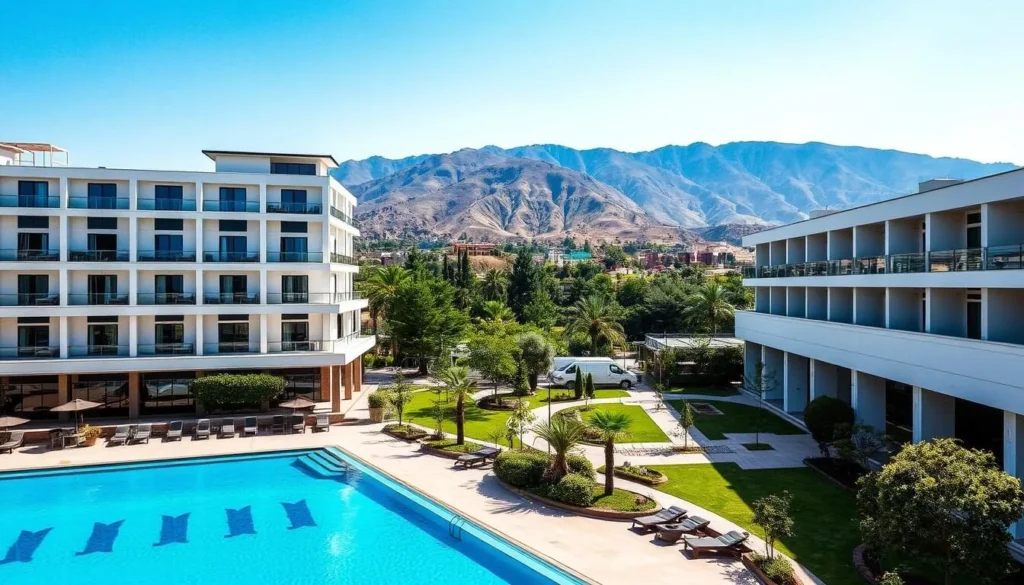
Islamabad offers accommodation options for every budget. Here are the best areas and recommendations:
Budget Options
For travelers on a budget, hostels and guesthouses in sectors F-6 and G-6 offer affordable stays. Backpackers Hostel and Guesthouse Islamabad is a popular choice with dormitory and private rooms available.
Price range: $15-40 per night
Mid-Range Options
Sectors F-7, F-8, and Blue Area offer excellent mid-range hotels with good amenities. Jasmine Inn provides comfortable rooms with modern facilities and is centrally located for easy access to attractions.
Price range: $50-100 per night
Luxury Options
For premium experiences, consider the Diplomatic Enclave area. The Islamabad Serena Hotel offers five-star luxury with beautiful architecture, multiple dining options, and excellent service.
Price range: $150+ per night
Important: When booking accommodation, ensure you’re staying in Islamabad proper, not neighboring Rawalpindi. While the cities are adjacent, they offer very different experiences. Islamabad is quieter, cleaner, and more organized.
Find Your Perfect Stay in Islamabad
Browse top-rated accommodations with instant confirmation:
15 Best Things to Do in Islamabad, Pakistan

1. Visit Faisal Mosque
Faisal Mosque is Islamabad’s most iconic landmark and a must-visit attraction. Funded by King Faisal of Saudi Arabia, this architectural marvel was once the largest mosque in the world. Its distinctive design resembles a Bedouin tent rather than traditional dome-shaped mosques, creating a striking silhouette against the Margalla Hills backdrop.
For the best experience, visit during the sunset prayer (Maghrib). As the call to prayer echoes across the city, the mosque lights up beautifully against the darkening sky. Visitors can join the prayer inside or simply appreciate the spiritual atmosphere from the courtyard.
Tip: Visitors are not allowed inside the main prayer hall outside of prayer times, so plan accordingly. Modest dress is required – women should cover their heads, arms, and legs, while men should wear long pants.
2. Hike in the Margalla Hills
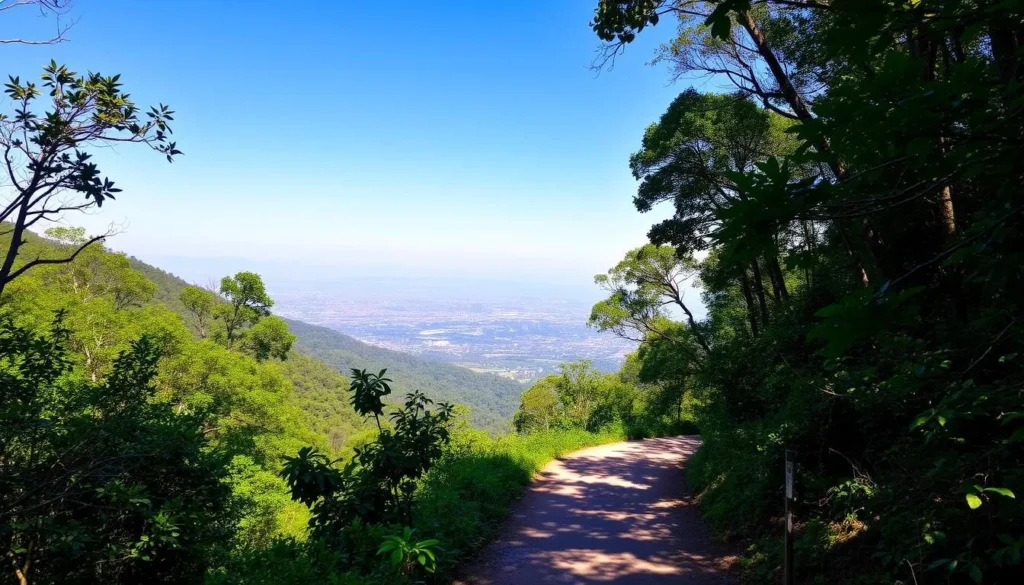
The Margalla Hills National Park offers a refreshing escape from the city with numerous hiking trails of varying difficulty. These trails provide stunning views of Islamabad and are popular with both locals and visitors seeking outdoor activities.
- Trail 3: Perfect for beginners, this trail offers two routes to Monal Restaurant – a direct steep path (1-1.5 hours) or a more gradual winding path (3-4 hours).
- Trail 5: A more challenging but scenic route with two seasonal water springs. The path becomes steep after the first hour, taking 2-3 hours to reach Monal.
- Trail 6: Starting behind Faisal Mosque, this less-frequented trail forms a loop through Jabri village with good tree cover and occasional wildlife sightings.
Safety Tip: Hike in groups, especially if you’re unfamiliar with the area. The hills are home to wildlife including leopards. Carry water, wear appropriate footwear, and let someone know your hiking plans. Mobile signals can be unreliable in some areas.
3. Explore Pakistan Monument

The Pakistan Monument, located on Shakarparian Hills, symbolizes the unity of Pakistan’s diverse cultures. Built in the shape of a blooming lotus flower, its four main petals represent the four provinces, while smaller petals represent territories. The monument offers one of the best panoramic views of Islamabad.
Visit in the early morning to avoid crowds or stay for sunset when the monument lights up against the evening sky. Don’t miss the Pakistan Monument Museum at the base, which chronicles the country’s history through impressive exhibits and multimedia presentations.
Tip: The monument gets crowded quickly, especially on weekends and holidays. Arrive early (around 9:00 AM) for a more peaceful experience.
4. Visit Lok Virsa Museum
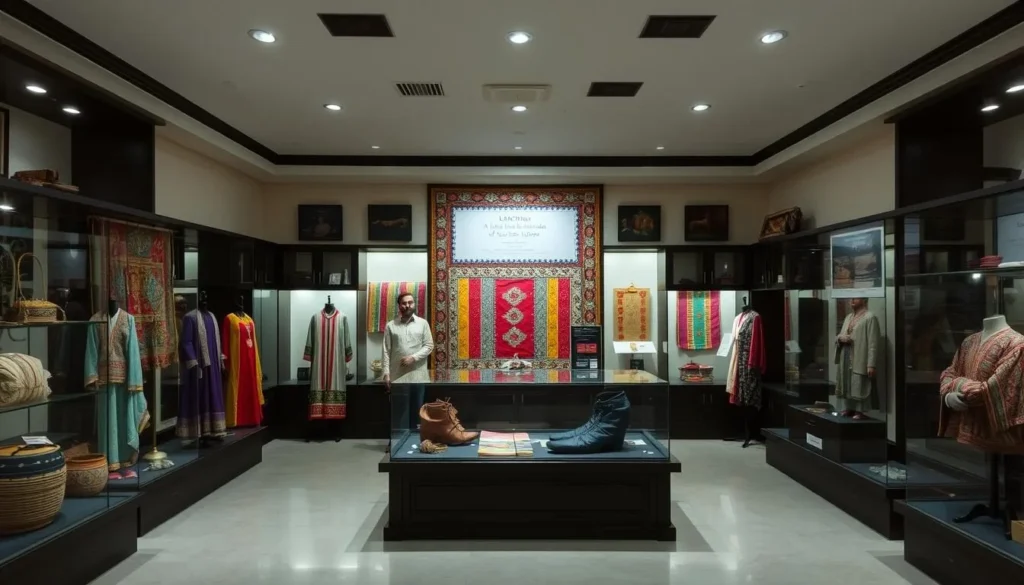
Just a short walk from the Pakistan Monument, the Lok Virsa Heritage Museum offers an immersive journey through Pakistan’s rich cultural heritage. This modern museum showcases the diverse traditions, art, and folklore of Pakistan’s various regions.
The museum features both indoor and outdoor exhibitions, including traditional architecture, crafts, musical instruments, and cultural artifacts. You can listen to recordings of traditional music and watch documentaries about Pakistan’s cultural history. Before leaving, visit the sales center to purchase authentic handicrafts as souvenirs.
Note: Photography is generally not permitted inside the museum, so be prepared to fully immerse yourself in the experience without distractions.
5. Discover Saidpur Village
Saidpur Village offers a glimpse into pre-Islamabad history, when the area was just a collection of small villages. This restored heritage site showcases the multicultural past of the region, with a Hindu temple, Sikh gurdwara, and Islamic mosque standing side by side.
Beyond the tourist center at the entrance, you can wander through the village to experience authentic rural life. The area also features several restaurants serving traditional Pakistani cuisine in a historic setting, making it a perfect spot for dinner with cultural ambiance.
6. Take in the Views at Daman-e-Koh
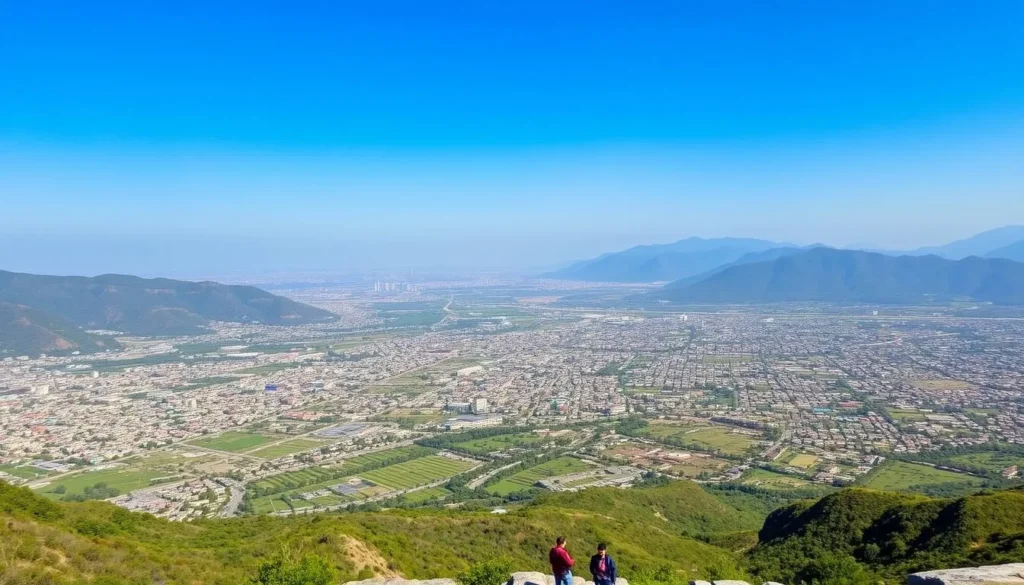
Daman-e-Koh, meaning “foot of the mountain,” is a popular viewpoint offering spectacular panoramic views of Islamabad. Located on the way to Pir Sohawa, this hillside garden and lookout point is perfect for appreciating why Islamabad is called Pakistan’s greenest city.
On Sundays, the area transforms into a lively spot with small carnival-like attractions, food stalls, and families enjoying their day off. It’s an excellent opportunity to mingle with locals and experience Pakistani family culture.
Tip: Visit around 3-4 PM when the light is perfect for photography. If using Uber to get here, negotiate with your driver to wait and take you back, as mobile signals can be unreliable in the hills.
7. Dine at Monal Restaurant
Perched high in the Margalla Hills, Monal Restaurant offers one of the most spectacular dining views in Islamabad. While the food might not be the absolute best in the city, the panoramic vistas of Islamabad spread out below make it worth the visit.
The restaurant serves both Pakistani and international cuisine, with outdoor seating that maximizes the breathtaking views. It’s especially beautiful at sunset when the city lights begin to twinkle below.
Tip: Make reservations in advance, especially for dinner and weekends. The restaurant can get very busy.
8. Shop at Itwar Bazaar (Sunday Market)
Despite its name meaning “Sunday Market,” Itwar Bazaar operates on Tuesdays, Fridays, and Sundays. This sprawling market offers everything from fresh produce to secondhand clothes, electronics, and household items at bargain prices.
The market is particularly good for budget travelers looking to pick up warm clothing before heading to northern Pakistan. You can find quality secondhand jackets, hiking boots, and even backpacks at a fraction of their original cost.
Tip: Tuesday markets typically offer the best deals with fewer crowds, while Sunday markets are the busiest and most vibrant.
9. Relax at Rawal Lake
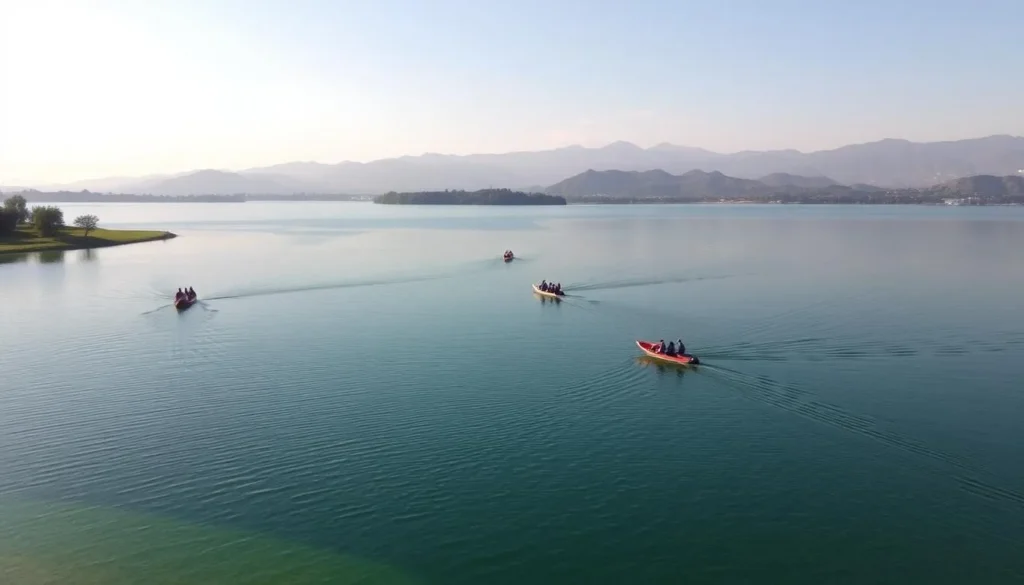
Rawal Lake is an artificial reservoir that supplies water to Islamabad while offering recreational opportunities for visitors. The lakeside is a popular spot for picnics, boat rides, and simply enjoying the peaceful atmosphere away from the city center.
Early mornings are the best time to visit when the lake is calm and the area is less crowded. You can rent a boat for a leisurely ride or enjoy snacks from the various food stalls along the shore.
Note: Some areas around the lake can be littered. Walk a bit further from the main parking areas to find cleaner, quieter spots.
10. Explore Old Rawalpindi
While technically a separate city, Rawalpindi (or “Pindi” as locals call it) is Islamabad’s twin city with a completely different character. Unlike planned Islamabad, Rawalpindi is older, busier, and more chaotic – offering a glimpse into traditional Pakistani urban life.
The old city center features historic buildings, bustling bazaars like Raja Bazaar, and religious sites reflecting the area’s diverse heritage. Take the Metro Bus from Islamabad to avoid traffic hassles, getting off at Waris Khan station to explore the old city center.
Tip: If you don’t have time to visit Lahore, Rawalpindi’s old city provides a good alternative experience of traditional Pakistani urban life.
11. Visit Shah Allah Ditta Caves
The ancient Shah Allah Ditta caves date back thousands of years and offer a unique historical experience on the outskirts of Islamabad. Surrounded by massive banyan trees, these sandstone caves were once used by Buddhist monks for meditation before becoming a Muslim site.
On weekends, you might encounter local musicians playing Sufi music, adding to the mystical atmosphere. Several small cafes have opened near the caves, making it a pleasant spot to enjoy a cup of chai while soaking in the historical ambiance.
12. Stroll Through F9 Park

Fatima Jinnah Park (F9 Park) spans four square kilometers in the heart of Islamabad, providing a green oasis for residents and visitors alike. The park features a network of walking paths, sports facilities, and open green spaces perfect for morning jogs or evening strolls.
The park is particularly beautiful during sunrise and sunset, with flowers blooming almost year-round. It’s an ideal place to experience local life, as families gather for picnics and young people play cricket or other sports.
13. Visit Golra Railway Station Museum
Golra Railway Station, on the outskirts of Islamabad, houses a fascinating railway museum showcasing Pakistan’s railway heritage. The small regional station features preserved steam engines, vintage coaches, and railway memorabilia dating back to the British colonial era.
The station itself is a step back in time, especially in the evening when the station lights come on and trains pass by. It’s a hidden gem for history enthusiasts and photographers looking for unique subjects.
14. Enjoy Local Cuisine
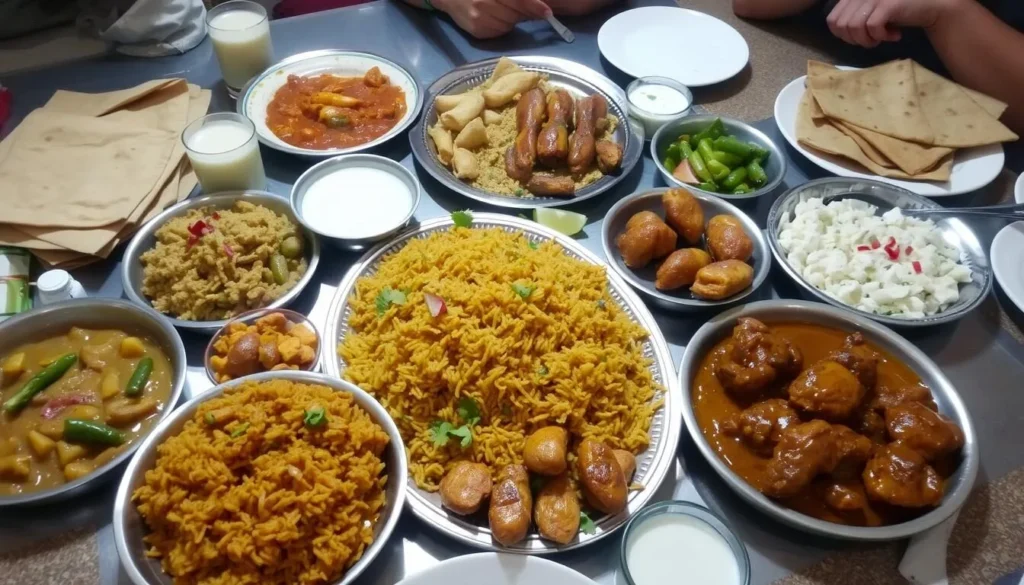
Islamabad offers diverse dining options, from street food to upscale restaurants. Here are some must-try culinary experiences:
- Melody Food Park: Located in G-6 markaz, this food street offers affordable local delicacies including samosas, kebabs, and fresh juices.
- Cheema & Chatta: Experience a traditional Pakistani breakfast with halwa puri or the more adventurous paaye (stewed goat hoof).
- Quetta Tea & Teas: This 24/7 dhaba in F-10 markaz serves some of the best chai in Islamabad, making it a popular late-night hangout spot.
- Street One: Try their famous cookie skillet for a sweet treat.
- Savour Foods: Known for their delicious pulao (rice dish) and kheer (rice pudding).
15. Shop for Souvenirs
Take home a piece of Pakistani culture with these shopping options:
- Jinnah Super Market: Find quality handicrafts, textiles, and contemporary Pakistani fashion.
- Super Market (F-6): Browse local boutiques for traditional clothing, jewelry, and home decor items.
- Lok Virsa Sales Center: Purchase authentic cultural artifacts and handicrafts directly supporting local artisans.
- Centaurus Mall: For modern shopping with both international brands and local designers.
Experience the Best of Islamabad
Book guided tours and activities to make the most of your visit:
Browse Islamabad Tours
Practical Tips for Visiting Islamabad

Mobile Connectivity
Staying connected is essential for navigating Islamabad:
- Local SIM Card: Zong offers reliable coverage for foreigners. Visit the Zong Customer Experience Center on Jinnah Avenue (between sectors G-7/3 and F-7/4) with your passport to purchase a SIM card.
- Avoid Airport SIM Cards: These are typically overpriced. Wait until you reach the city to get a better deal.
- VPN: Consider installing a VPN before traveling to ensure access to all your usual services.
Safety Information
Islamabad is generally considered one of the safest cities in Pakistan, but standard travel precautions apply:
- Keep copies of important documents and store originals securely.
- Respect local customs and dress modestly, especially at religious sites.
- Women travelers should consider wearing a scarf (dupatta) in more conservative areas.
- When hiking in the Margalla Hills, go in groups and inform someone of your plans.
- Use ride-hailing apps like Uber rather than hailing unknown taxis.
Money Matters
Financial tips for your Islamabad visit:
- The local currency is the Pakistani Rupee (PKR).
- ATMs are widely available in commercial areas and shopping centers.
- Major hotels and upscale restaurants accept credit cards, but carry cash for smaller establishments and markets.
- Tipping (10-15%) is appreciated but not mandatory in restaurants.
- Daily budget: Budget travelers can manage on $30-50 per day, mid-range travelers $50-100, and luxury travelers $150+.
Cultural Etiquette
Respecting local customs will enhance your experience:
- Greet people with “Assalam Alaikum” (peace be upon you).
- Remove shoes when entering homes or religious buildings.
- Dress modestly – shoulders and knees should be covered.
- Ask permission before photographing people, especially women.
- Use your right hand for eating and passing items.
- During Ramadan, avoid eating, drinking, or smoking in public during daylight hours.
Frequently Asked Questions About Islamabad
Is Islamabad worth visiting?
Yes, Islamabad offers a unique perspective on Pakistan that differs from other major cities. While it may not have the historical depth of Lahore or the bustling energy of Karachi, its natural beauty, orderly layout, and proximity to the Margalla Hills make it worth at least 2-3 days of exploration. It’s also an excellent gateway to northern Pakistan’s mountain regions.
How many days do I need in Islamabad?
A minimum of 3 days is recommended to explore Islamabad’s main attractions at a comfortable pace. If you plan to include hiking in the Margalla Hills or a day trip to Taxila’s ancient ruins, consider extending your stay to 4-5 days.
Does Islamabad have nightlife?
Islamabad has limited nightlife compared to Western cities. The city generally winds down by 10-11 PM, with few venues open late. Some hotels host events, and places like Quetta Tea & Teas operate 24/7, becoming social hubs in the evening. For a more vibrant evening scene, look for private events or gatherings through local connections.
What’s the difference between Islamabad and Rawalpindi?
Though adjacent to each other, these twin cities offer contrasting experiences. Islamabad is a planned city with wide roads, organized sectors, abundant greenery, and a calm atmosphere. Rawalpindi is older, more chaotic, with narrow streets, bustling bazaars, and a more traditional urban Pakistani experience. Most tourists prefer staying in Islamabad while making day trips to Rawalpindi.
Islamabad Map of Key Attractions
Experience the Green Heart of Pakistan
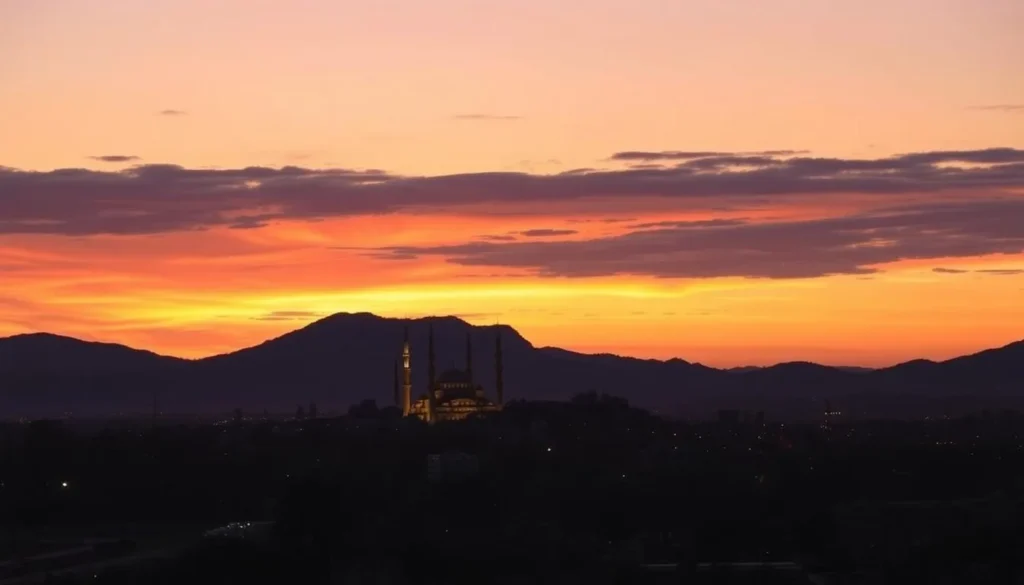
Islamabad offers a refreshing contrast to Pakistan’s other major cities, with its clean streets, abundant greenery, and breathtaking mountain backdrop. Whether you’re hiking in the Margalla Hills, exploring cultural sites like Faisal Mosque, or simply enjoying the peaceful atmosphere, the capital city provides a perfect introduction to Pakistan’s diverse attractions.
With its blend of natural beauty, cultural heritage, and modern amenities, Islamabad invites you to discover a side of Pakistan that often goes unnoticed by travelers focused only on the country’s northern mountains or historic cities. Take time to appreciate the capital’s unique charm before continuing your Pakistani adventure.
Ready to Explore Islamabad?
Start planning your journey to Pakistan’s green capital today:
Browse Accommodations
Discover Tours & Activities
—
The above is subject to change.
Check back often to TRAVEL.COM for the latest travel tips and deals.
